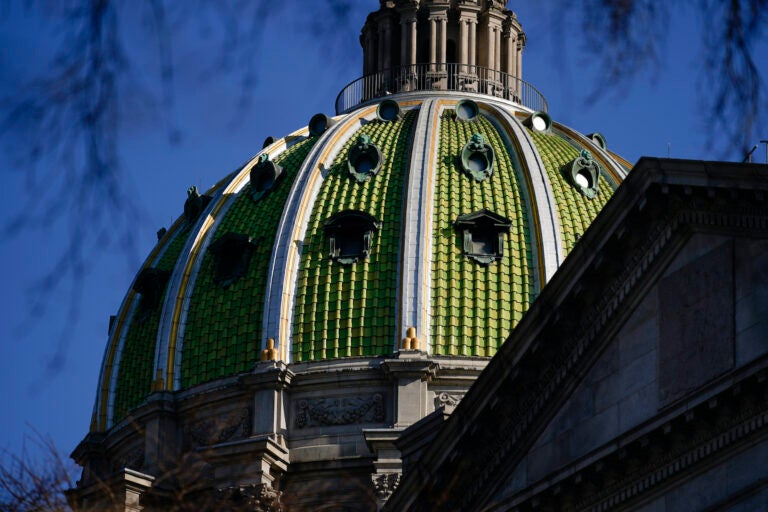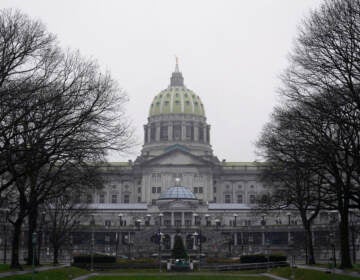Inside Pa. candidates’ scramble to get on the ballot in a chaotic, must-win year
This year, a protracted court battle over new legislative maps led to significant delays in finalizing district lines, cutting the petition timeline in half.
Listen 5:15
The Pennsylvania Capitol in Harrisburg, Pa., Monday, March 22, 2021. (Matt Rourke/AP Photo)
At 5 p.m. on a recent Thursday, Vito Malacari had already finished a full day of work as a 9th grade history teacher, and was on to his second job of the day: driving around Luzerne County, trying to gather all the signatures he’d need in order to run for Pennsylvania’s state House.
He wasn’t the only one following that kind of routine.
For the past ten days, hundreds of candidates for Pennsylvania’s state House and Senate have been scrambling to collect the signatures they need for the nomination petitions that will get them on the ballot for this year’s midterm elections.
Typically, they get three weeks. But this year, a protracted court battle over new legislative maps led to significant delays in finalizing district lines, and prompted the state Supreme Court to cut the petition timeline in half to avoid delaying the May 17 primary.
“Every couple of days, somebody would come out with a new rumor that, hey, petitions are going to start now or petitions are going to start now,” Malacari said. “Once they announced the date … my initial feeling was panic and dread.”
This is Malacari’s first foray into politics, and he now knows he picked a weird year.
Pennsylvania’s new legislative maps, particularly the House map, make Democrats more competitive than they’ve been in at least a decade.
Despite national-level headwinds, Democrats believe they have a path to controlling the state House for the first time since 2010. This frenzied, last-minute signature-gathering period comes as both parties feel immense pressure to make sure they run as many strong candidates as possible.
For Democrats, the 119th House district in purple Luzerne County is key.
“I think this is one of the top three seats in the state,” said Malacari, who jumped into the race when the incumbent, Gerald Mullery, decided not to run again. “It’s an open seat, a seat held by a Democrat, one that if they want to win the majority, they’re going to need to hold.”
“I feel no pressure whatsoever,” he added, sarcastically.
Signature-gathering is a candidate’s first big challenge of the race.
House hopefuls need to get at least 300 unique signatures from residents of their hoped-for district who are registered to their party, and Senate candidates need 500. Most aim to get at least twice as many, since opposing parties and candidates frequently challenge signatures to get them tossed out on technicalities.
Because he’s a new candidate in a high-priority district, Malacari noted that he’s been lucky — he’s gotten a lot of institutional support.
Democratic Party leaders, he said, “started pushing out a ton of emails with information like, ‘Hey, this is how you do your petitions, these are good petitions, these are bad petitions’ … They’re asking for daily reports of how many signatures we have.”
State and local party committees are doing similar work around the state: trying to support new candidates as they get as many signatures as they can, as fast as they can. Trevor Southerland, who heads the House Democratic Campaign Committee and works to get Democrats elected, says it’s not ideal for anyone.
“It’s an organized chaos,” he said.
That’s similar to the way Republican Tracy Pennycuick describes the latest signature-gathering process.
Pennycuick, a longtime army helicopter pilot, has spent one term representing the 147th state House district in fairly conservative, northern Montgomery County. But now she’s running for the 24th Senate District to replace her retiring GOP colleague Bob Mensch.
She got tapped for the race, in large part, because this is a hard year to get on the ballot.
“Bob actually came to me and asked me if I would consider it,” she said. “I wasn’t really too interested in moving, but given that we had a compressed schedule with redistricting, he really felt like it would have to be someone who had experience already running a campaign … He kind of talked me into it.”
Her district regularly sees tough races, and she expects that this one is “going to be a fight.” But while Democrats are working with friendlier maps and gunning for legislative control, Pennycuick notes, political winds are blowing strongly in Republicans’ favor.
“I think we are in a really crazy time right now on the national level,” she said. “People are struggling to pay their home heating bills and put food on the table, and our grocery bills have gone up… I think it’s going to be more of a red wave.”
Despite being initially “very, very worried” about the shortened petition timeline, she said it’s actually been easier than her first one, and she hasn’t needed help from state-level Republicans.
“I have name recognition,” she said. “I have a lot of supporters who came out and signed for me… it’s just members of the community. They are just your everyday mom and dad. Little kids at home, a retiree, a civil engineer. It’s just a network.”
For candidates who don’t get party endorsements, and also haven’t been in office before, the signature-gathering process can look a little different.
With the deadline looming, Paul Prescod spent hours last week on a street corner by Clark Park, in West Philly. He’d pegged it as a consistently high-foot-traffic area, and managed to add about ten signatures to his total over the course of an hour.
Prescod — who, like Malacari, worked as a high school history teacher — is trying to primary longtime state Senator Anthony Williams. Williams, who serves as Democratic whip, won his seat after his father retired in 1998 and hasn’t had a serious challenger since.
Prescod is running to Williams’ left, with strong backing from labor and Democratic socialists, trying to make the case for funding public schools more aggressively and fighting privatization.
He was planning to overshoot the Senate’s 500-signature by a lot: his goal was 2,000.
“Likely, people will challenge them,” he said. “There are many candidates in recent history who have gotten knocked off the ballot … That’s why we’re being really careful.”
He doesn’t get any support from state Democrats so, he said, his campaign has had to make its own infrastructure.
“We have a great grassroots base that’s been helping us,” he said. “Philly [Democratic Socialists of America] members have been very involved in helping us … One of my most supportive endorsing unions is the Teamsters, they’ve been mobilizing members to help with petition-gathering. Close friends and family in the district are helping. It’s kind of like all hands on deck.”
It’s a little tough, he acknowledged, to be working on such a short timeline as a new, outsider candidate. But there are also parts of the petitioning process that work as a kind of equalizer.
Pennsylvania’s petitioning process is old-fashioned. There’s no online filing, so no matter how many signatures candidates get, or how powerful they are, or how many people are helping them, they have to drive them to Harrisburg in person.
The deadline is Monday. After that, the race really starts.

Get daily updates from WHYY News!
WHYY is your source for fact-based, in-depth journalism and information. As a nonprofit organization, we rely on financial support from readers like you. Please give today.






